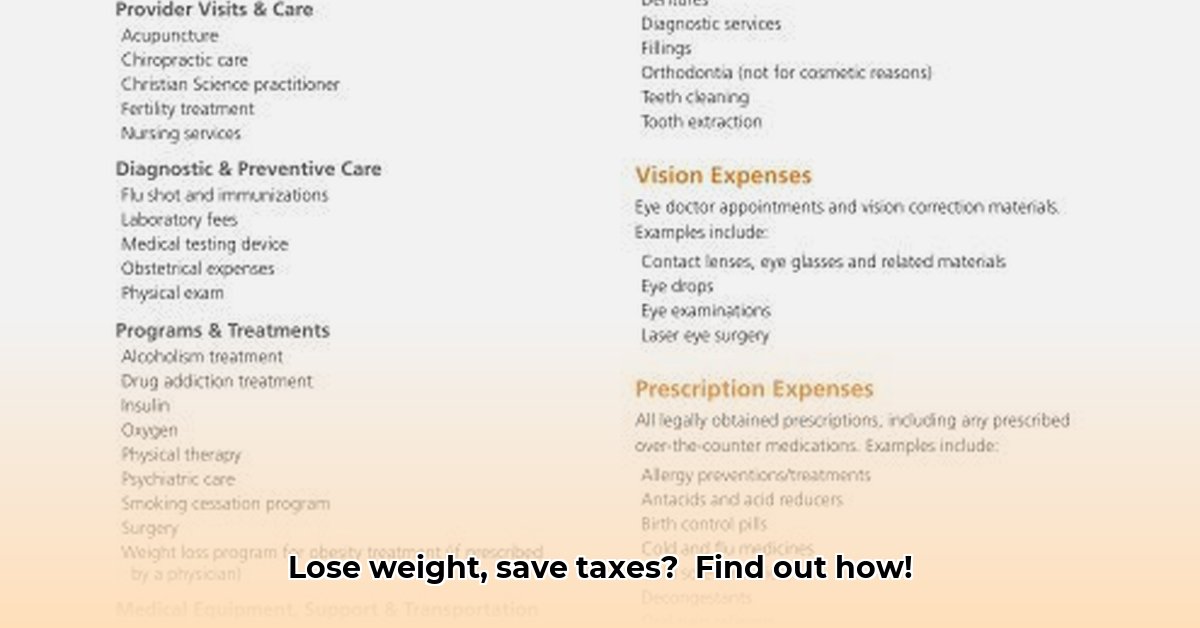
Losing weight and saving money simultaneously? It's achievable with the strategic use of Health Savings Accounts (HSAs) and Flexible Spending Accounts (FSAs). This guide outlines how to leverage these accounts for medically necessary weight loss, maximizing your tax advantages.
Understanding HSA and FSA Eligibility for Weight Loss
The critical factor determining HSA/FSA eligibility for weight loss is medical necessity. Simply wanting to lose weight isn't sufficient. Your weight loss must be part of a medically necessary treatment plan for a diagnosed health condition. Conditions such as type 2 diabetes, hypertension, or sleep apnea, where weight loss significantly impacts treatment, are often eligible.
A critical document is the Letter of Medical Necessity (LMN) from your physician. This letter certifies that your weight loss program is medically required to manage a specific health condition. Without it, reimbursement is unlikely. This LMN should explicitly detail the connection between your weight loss plan and your diagnosed health issue.
HSA vs. FSA: Choosing the Right Account
HSAs and FSAs offer distinct advantages:
| Feature | HSA | FSA |
|---|---|---|
| Ownership | You own it; portable across jobs. | Employer-sponsored; may be lost upon job change. |
| Contribution Limits | Generally higher, set annually by the government. | Lower, set annually by your employer. |
| Rollover | Unspent funds roll over. | Unused funds usually forfeit at year's end. |
| Tax Advantages | Triple tax advantage (contributions, growth, withdrawals tax-free for qualified expenses). | Pre-tax contributions; tax-free for qualified medical expenses. |
Consider an HSA as a long-term healthcare savings vehicle, while an FSA functions more as a short-term plan for anticipated annual expenses. Which is better for you depends on your individual circumstances and healthcare planning. Do you need long term savings potential or only short term?
Eligible Weight Loss Expenses: A Detailed Look
Many weight loss strategies can be HSA/FSA-eligible, provided they're medically necessary and outlined in your LMN. These include:
- Medically Supervised Weight Loss Programs: Programs with regular physician checkups, personalized nutrition plans, and structured exercise regimens designed to address your specific health condition.
- Prescription Weight Loss Medications: Medications prescribed by your doctor for weight-loss purposes linked to a diagnosed health issue. Over-the-counter supplements generally don't qualify.
- Medical Tests and Assessments: Blood tests, metabolic assessments, and, in some cases, bariatric surgery (with explicit medical justification).
Ineligible Expenses: Generally, ineligible expenses include standard gym memberships, over-the-counter weight-loss aids, and weight-loss books or programs not recommended as part of a medically necessary treatment plan.
Step-by-Step Guide to Reimbursement
Physician Consultation: Discuss your weight loss goals and health concerns with your doctor. They will assess if a medically supervised program is suitable and issue an LMN if appropriate.
Obtain the LMN: Ensure your LMN clearly details your diagnosed condition, the prescribed weight loss program, and why it's medically necessary. Any ambiguity could lead to claim denial.
Program Selection: Choose a program consistent with your doctor’s recommendations as detailed in your LMN.
Meticulous Record Keeping: Maintain all receipts, invoices, and the LMN. Organized documentation is crucial for a smooth reimbursement process.
Submit Claims: Follow your HSA/FSA provider's instructions carefully. Include all necessary documentation – the LMN is paramount.
Tax Implications: Avoiding Penalties
Misusing your HSA or FSA for ineligible expenses can lead to penalties. HSA misuse may result in a 20% penalty plus income taxes on the misused funds. FSA penalties vary but often mean forfeiture of the funds. Accurate record keeping is vital for compliance.
Choosing the Right Weight Loss Program
Selecting a suitable program that aligns with your doctor's recommendations (as stated in your LMN) is crucial. Consider factors such as cost, structure, your personal preferences, and adherence to your doctor’s specific instructions.
Conclusion: A Path to Healthy Weight Loss and Tax Savings
Successful HSA/FSA utilization for weight loss requires careful planning, close collaboration with your physician, and meticulous record-keeping. Understanding the eligibility rules and obtaining a comprehensive LMN are key to realizing both health improvements and tax benefits. Consult with your healthcare provider and financial advisor for personalized guidance.